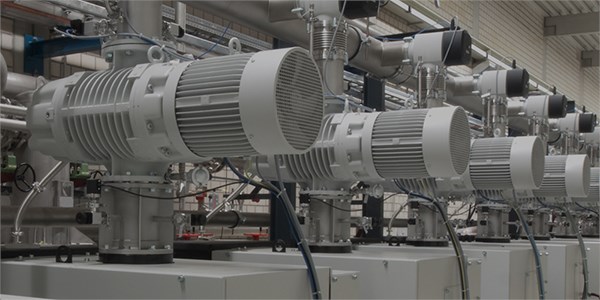
SEL-700BT
Motor Bus Transfer Relay
The SEL-700BT is an effective solution for an industrial motor bus transfer system, with multiple source transfer algorithms, flexible I/O, and advanced communications. It ensures process continuity by transferring critical loads from a primary source to an auxiliary feeder during faults in the primary feeder line. The relay allows automatic motor bus transfers using fast, in-phase, residual, and fixed-time methods to keep processes running without requiring a cold start. It is also possible to manually transfer load locally or remotely via communications.
The 5-inch, 800 × 480 color touchscreen display allows you to directly set, monitor, and control your system, including up to two breakers and eight two-position and two three-position disconnect switches. A small form factor and multiple mounting adapters make it easy to upgrade protection without cutting or drilling existing cutouts. You can quickly integrate the SEL-700BT into serial- or Ethernet-based communications with EtherNet/IP, the Rapid Spanning Tree Protocol (RSTP), IEC 61850 Edition 2, IEC 60870-5-103, the IEC 62439 Parallel Redundancy Protocol (PRP), Mirrored Bits communications, Modbus, DNP3, and other protocols.
Starting At
$7,850Multifunction Bus Transfer—Automatically transfer the motor bus feeder source in industrial plants to ensure process continuity. The bus transfer switches the motor bus to an alternate source via one of four transfer methods: fast, in-phase, residual, or fixed-time. Manual load transfer is also possible locally or remotely via communications. Power is restored before the motor slows down, protecting critical processes.
Complete Overcurrent Protection—Apply instantaneous and directional instantaneous overcurrent and time-overcurrent protection with as many as two sets of three-phase CTs and one neutral CT input. Phase overcurrent protection is provided for both three-phase inputs.
Synchronism Check—The built-in synchronism-check function provides supervision on both the X side and the Y side for the acceptable voltage window and maximum percentage difference, maximum and minimum allowable slip frequency, target closing angle, and breaker closing delay. The tie synchronism-check function provides the closing window for the bus-tie breaker when connecting to a utility system.
Breaker Wear Monitoring—Record accumulated breaker contact wear with the breaker monitor function, which uses the manufacturer’s specifications for defining breaker operation limits. The internal monitor tracks the total number of close/open operations and integrates the interrupted current per phase. You can set an alarm to alert operators when measured and accumulated quantities approach maintenance thresholds. This information facilitates proactive breaker maintenance and replacement without underutilizing resources.
Easy Communications—hoose from single or dual ports, copper or fiber-optic Ethernet or serial communications, and several protocols, including IEC 61850 Edition 2, EtherNet/IP, IEC 60870-5-103, the software-based IEEE 1588 Precision Time Protocol (PTP), IEC 62439 PRP and RSTP, Mirrored Bits communications, Modbus, DNP3 serial, and DNP3 LAN/WAN. Multiple Modbus TCP or Modbus serial sessions are available for custom configuration of your application.
Islanding Protection—Detect islanding conditions using the vector shift function with rate-of-change-of-frequency protection as backup. The vector shift function provides another element of protection for distributed generators connected to the utility network. It operates within three cycles—fast enough to prevent out-of-synchronization reclosing with the network feeders to avoid generator damage.
Reliable Protection in Harsh Environments—The SEL-700BT operates in extreme conditions, with an operating temperature of –40° to +85°C (–40° to +185°F), and it is designed and tested to exceed applicable standards, including vibration, electromagnetic compatibility, and adverse environmental conditions. In addition, the SEL-700BT is ATEX-certified and Underwriters Laboratories (UL) Class I, Division 2-certified for use in hazardous and potentially explosive environments.
Features
- Front
- Back
- Touchscreen—Home
- Touchscreen—Bay Screen
- Touchscreen—Breaker Control
- Touchscreen—Authentication
- Touchscreen—Fundamental Metering
- Touchscreen—Phasors
- Touchscreen—Energy Metering
- Touchscreen—Sequential Events Recorder
-
- 1
The 5-inch, 800 × 480 display offers direct navigation via a capacitive touchscreen.
- 2
Folders and applications provide quick access to bay screens, metering and monitoring data, reports, settings, and more.
- 3
Programmable front-panel LEDs with user-configurable labels alert operators to faulted phases, the relay’s status, and element operation.
- 4
Programmable operator pushbuttons with user-configurable labels allow front-panel customization.
1234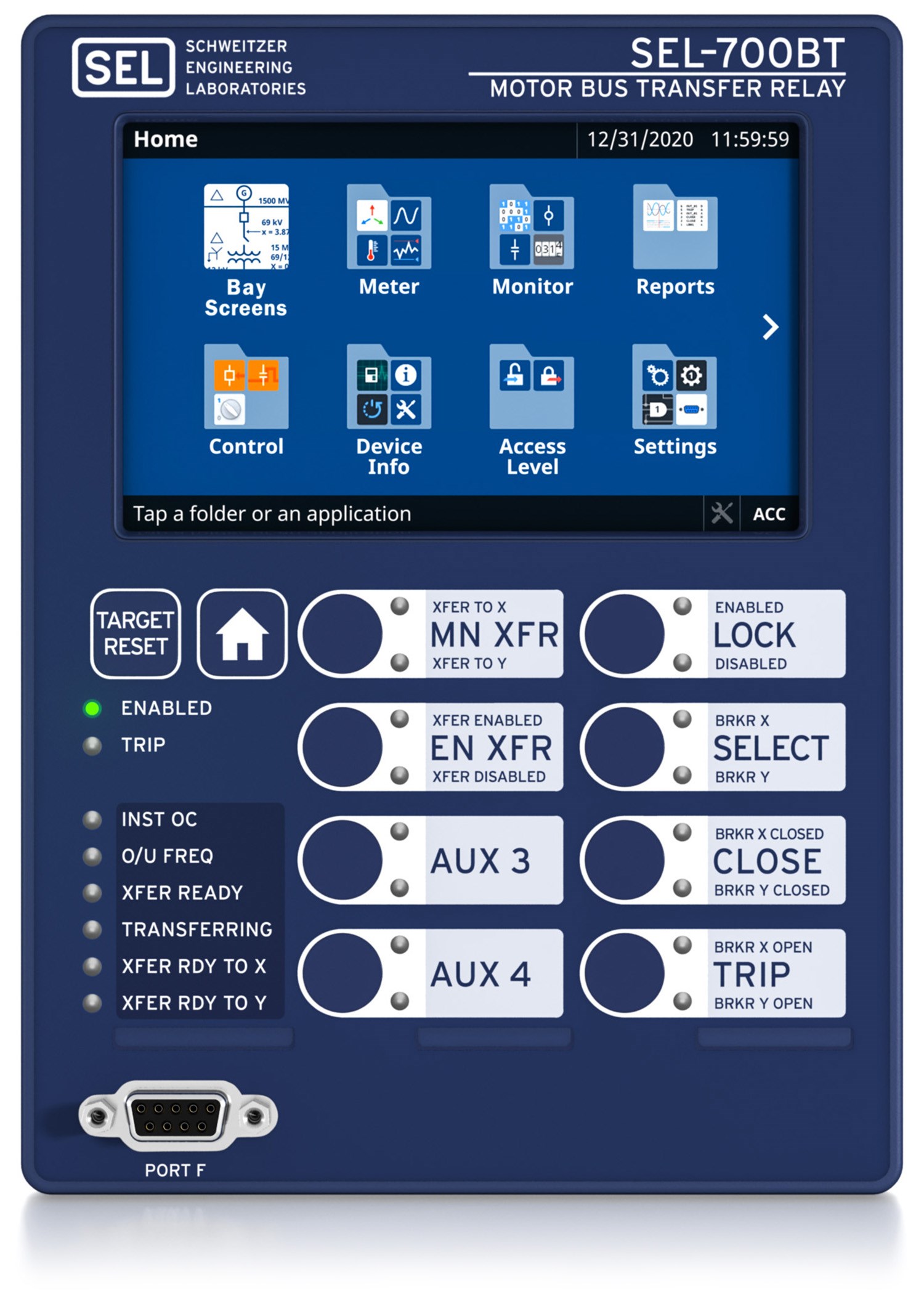
-
-
- 1
Power supply options include 24–48 Vdc or 110–250 Vdc/110–240 Vac
- 2
A wide variety of communications protocols and media provide flexibility to communicate with other devices and control systems.
- 3
An integrated web server enables direct relay access for metering and monitoring data without the need for external PC software.
- 4
Fiber-optic serial port.
- 5
Mirrored Bits communications provides fast and reliable relay-to-relay communication.
- 6
Positions for optional expansion cards.
- 7
Voltage and current inputs.
- 8
Optional RTD inputs.
12345678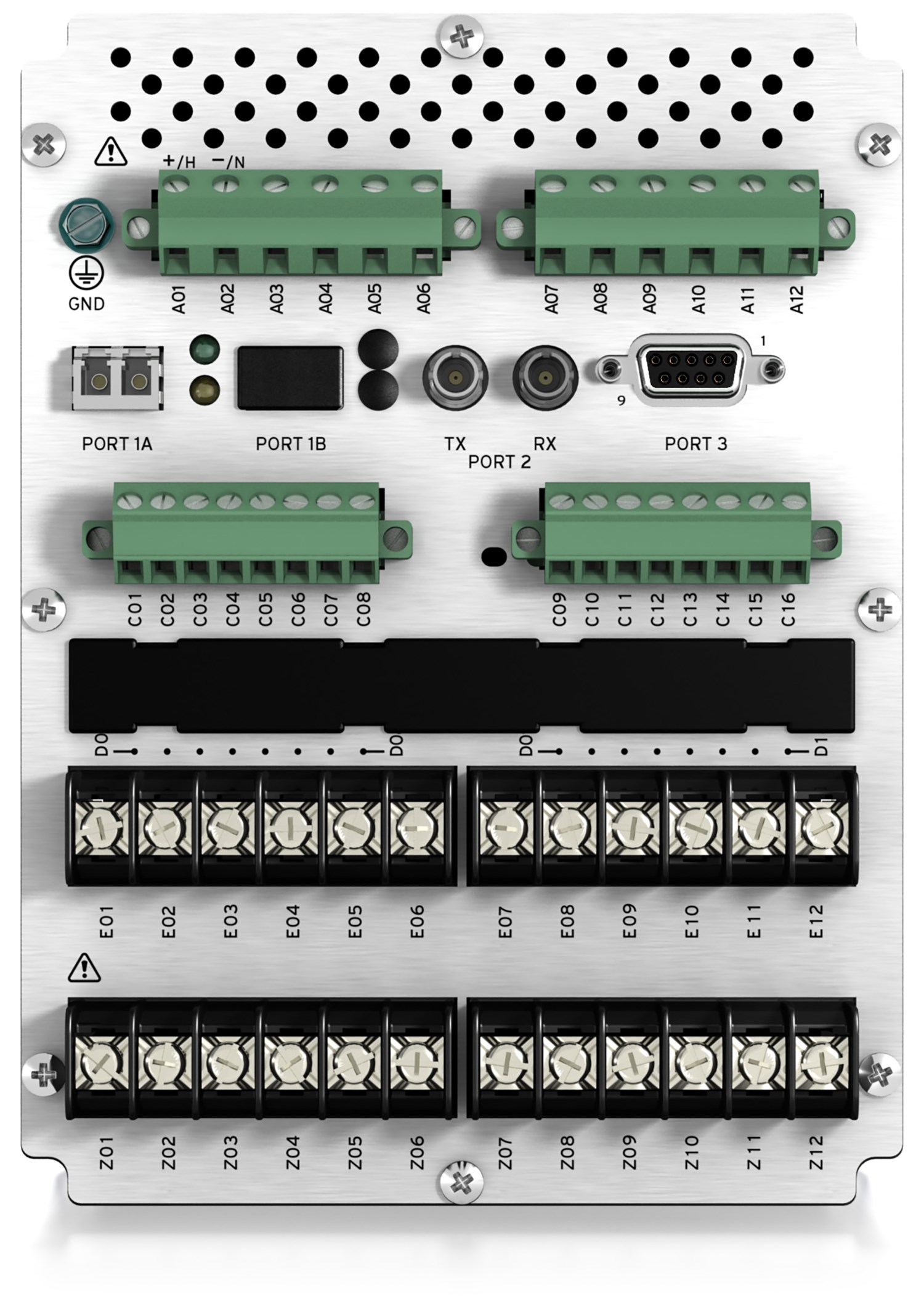
-
-
- 1
With a simple tap, quickly access bay screens, metering and monitoring data, reports, settings, and more.
1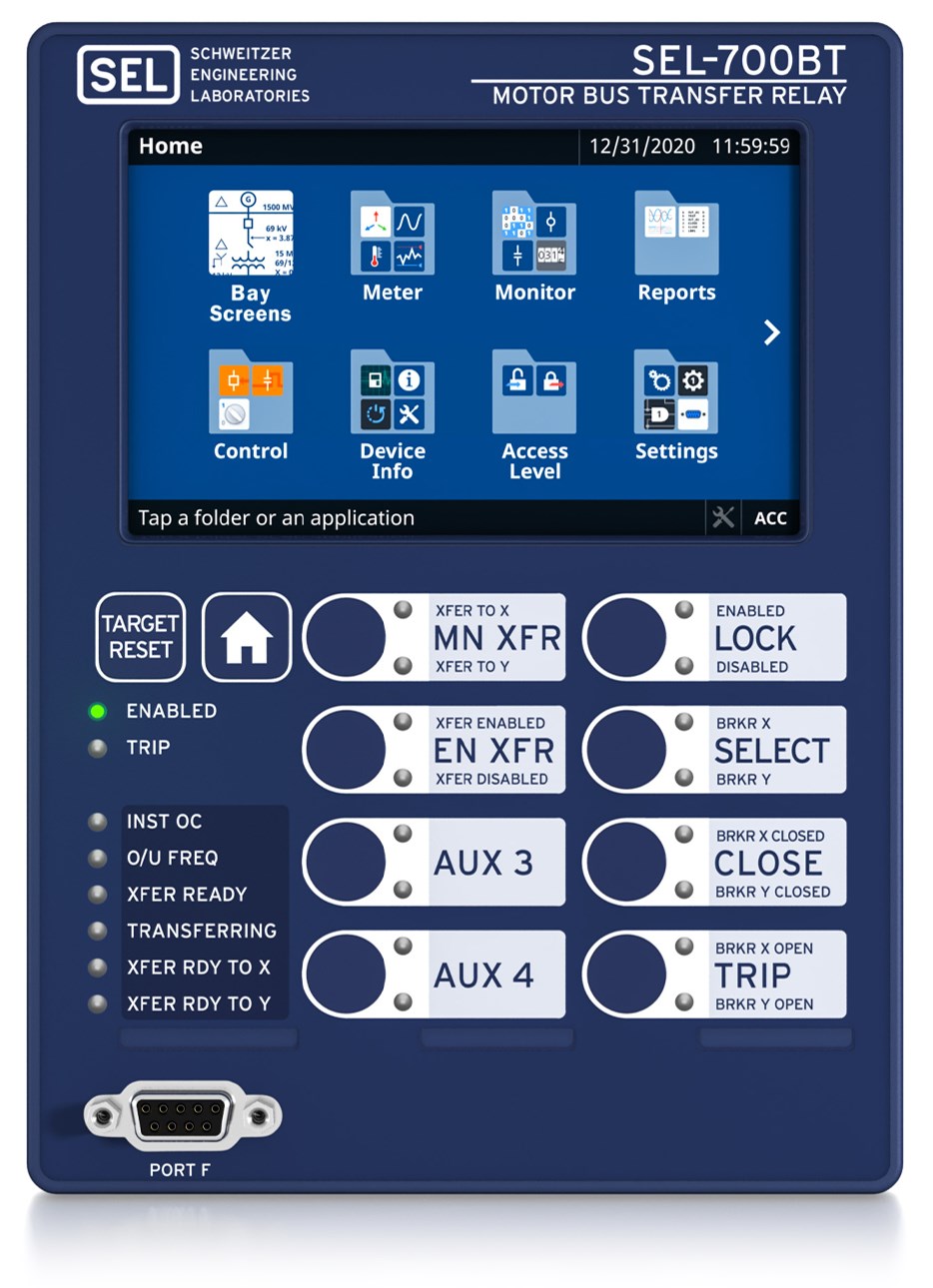
-
-
- 1
Select from predefined bay screens, or configure your own. Monitor and control your system, including up to two breakers and eight two-position and two three-position disconnect switches. View analog and digital data in a contextual display.
1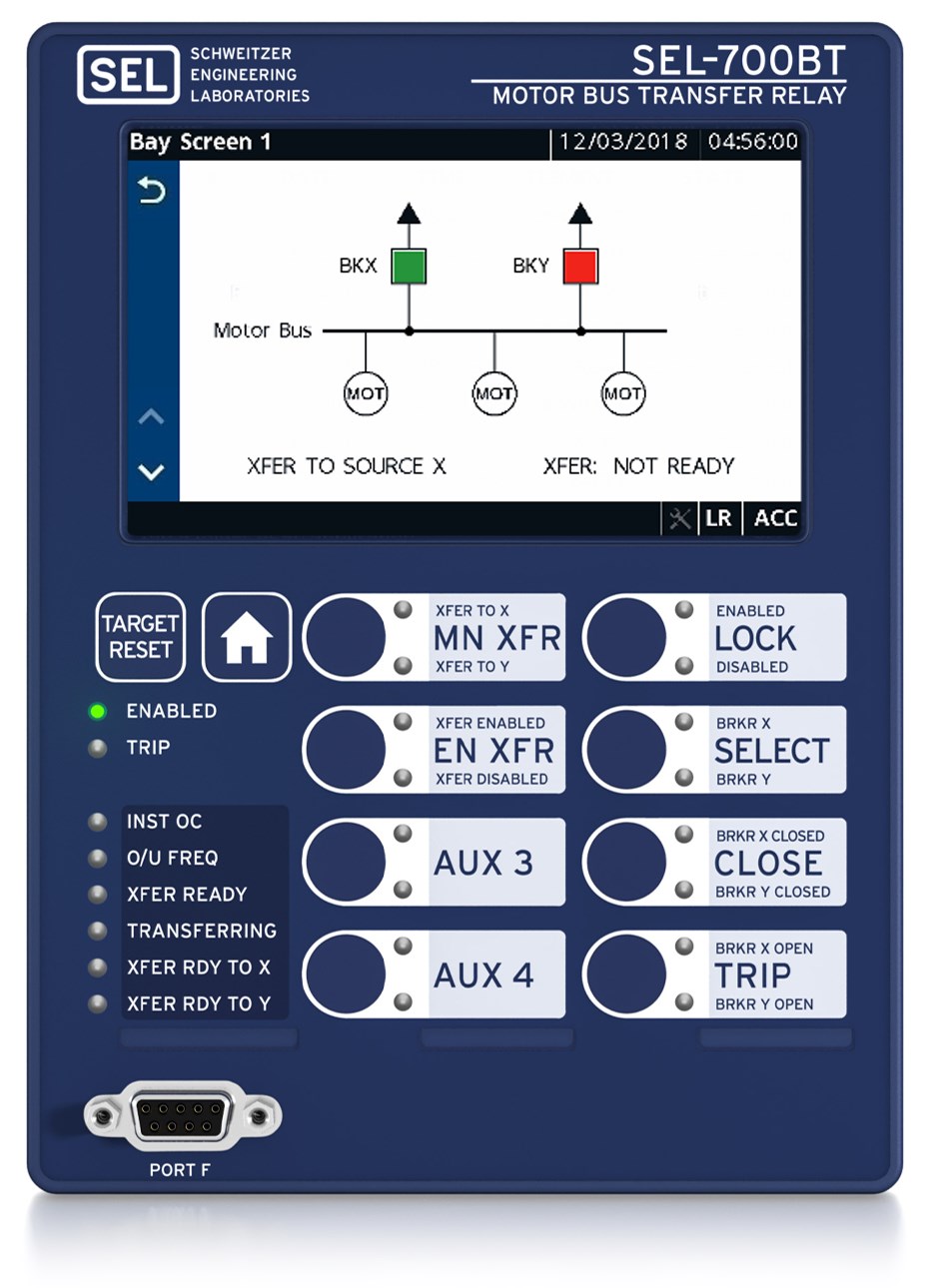
-
-
- 1
Verify breaker and disconnect changes using the secure control interface.
1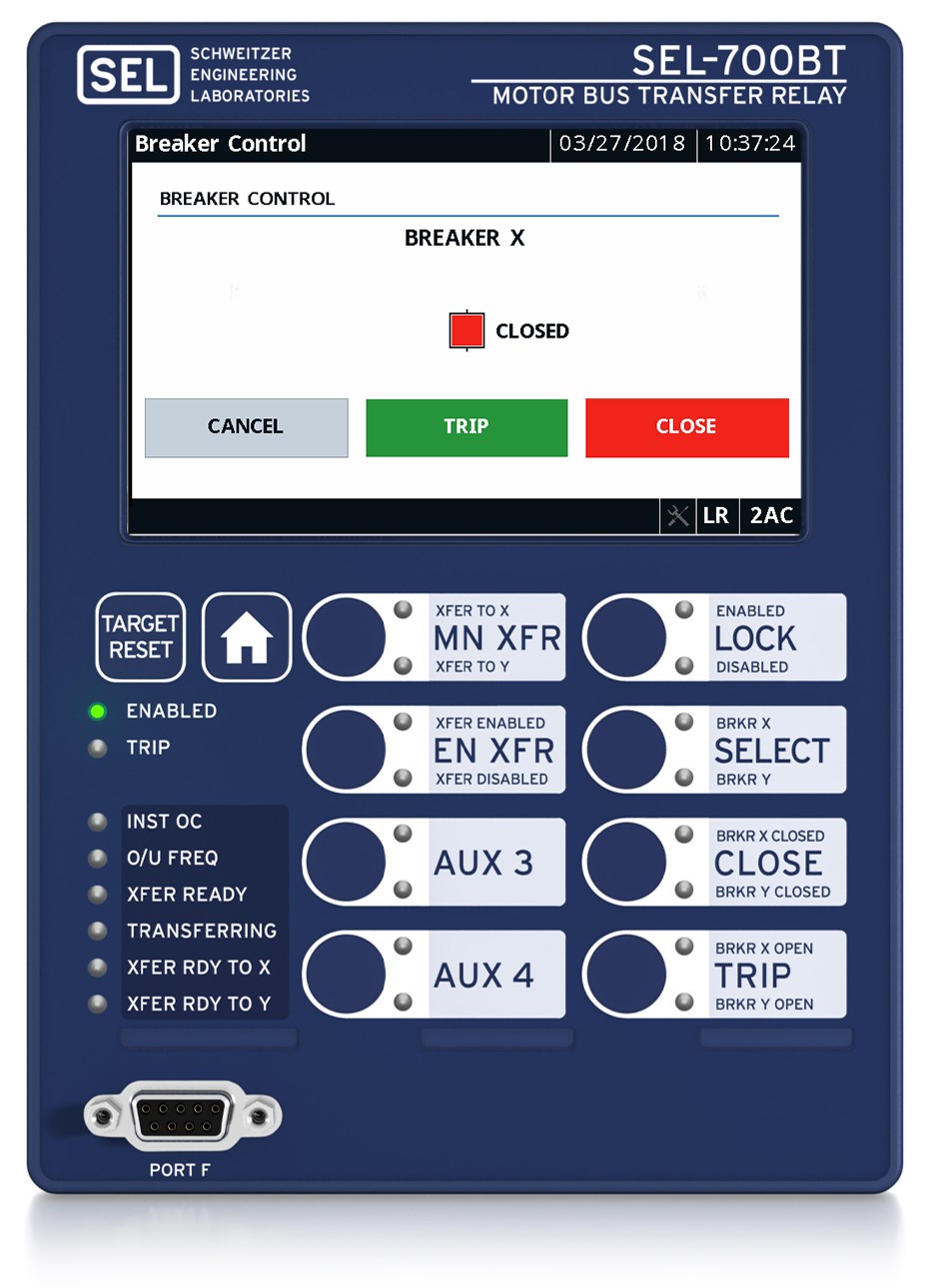
-
-
- 1
Use the onscreen keyboard to quickly and easily enter passwords, search for Relay Word bits, and enter settings.
1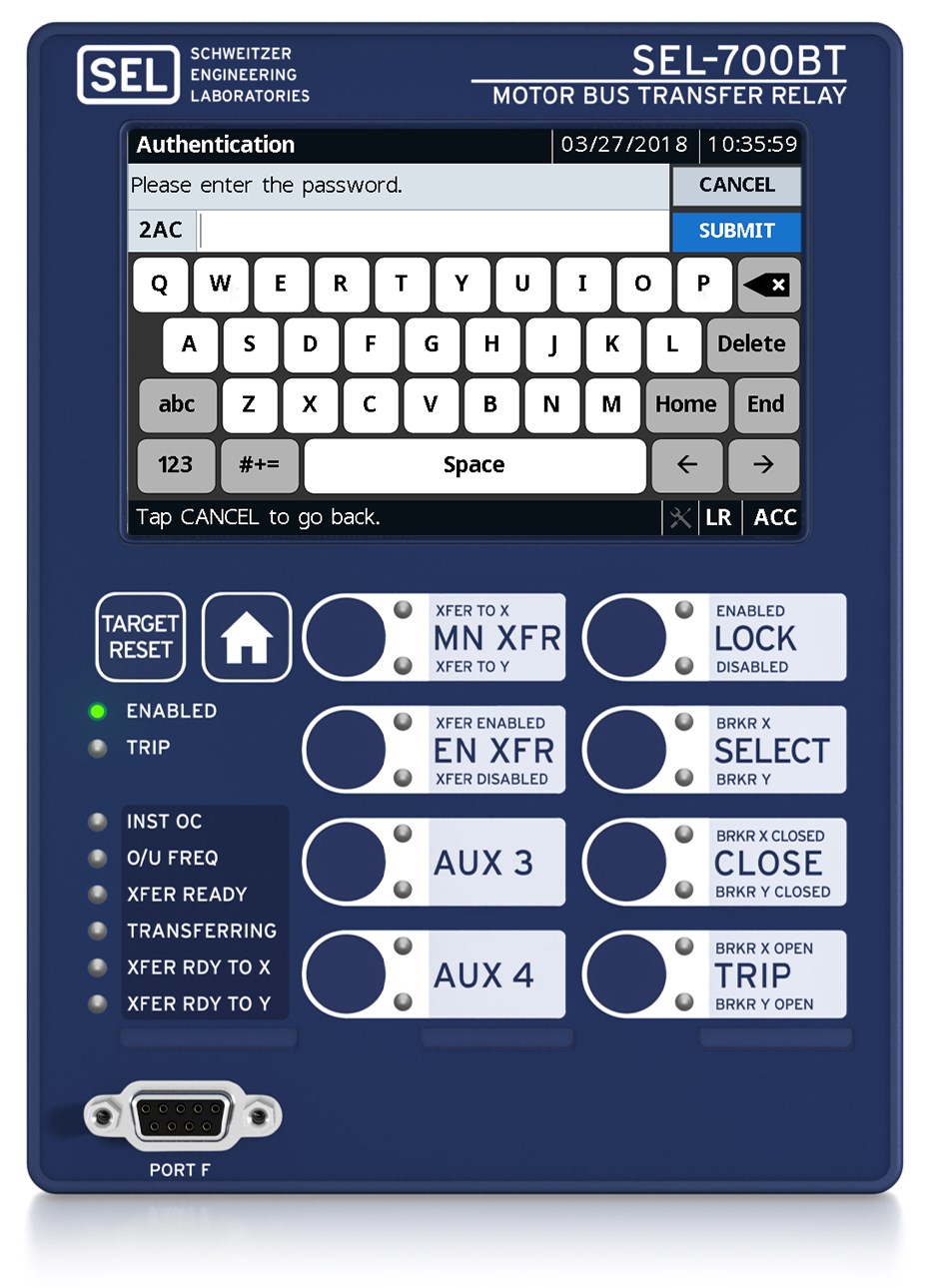
-
-
- 1
View the real, reactive, and apparent power of each phase, and monitor the power factor.
1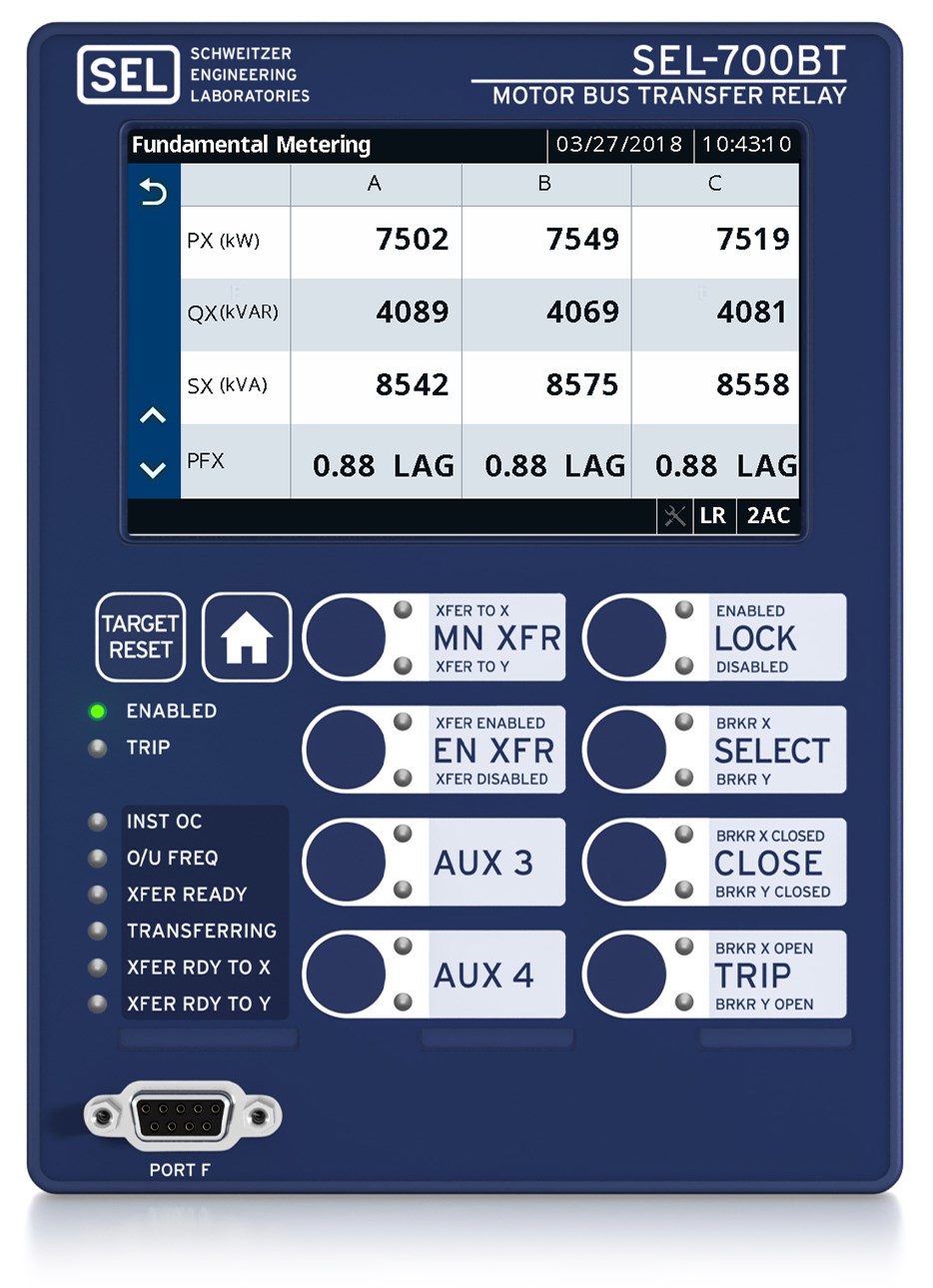
-
-
- 1
View a graphical and textual representation of the real-time voltages and current in a power system. Analyze the phasors to determine power system conditions.
1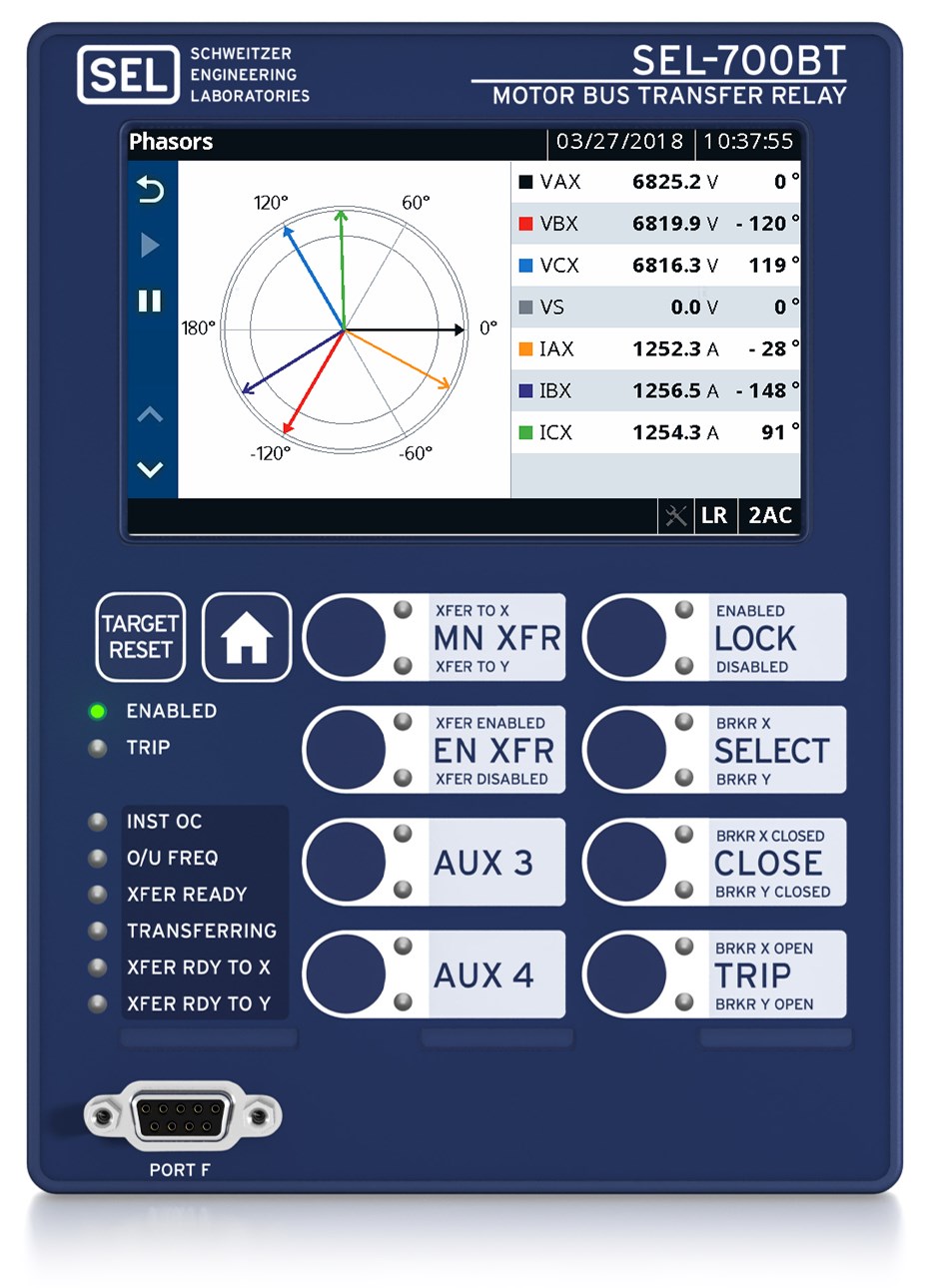
-
-
- 1
Display the real, reactive, and apparent energy metering quantities imported and exported in a system. Easily reset the values via the display, and record the time and date of reset.
1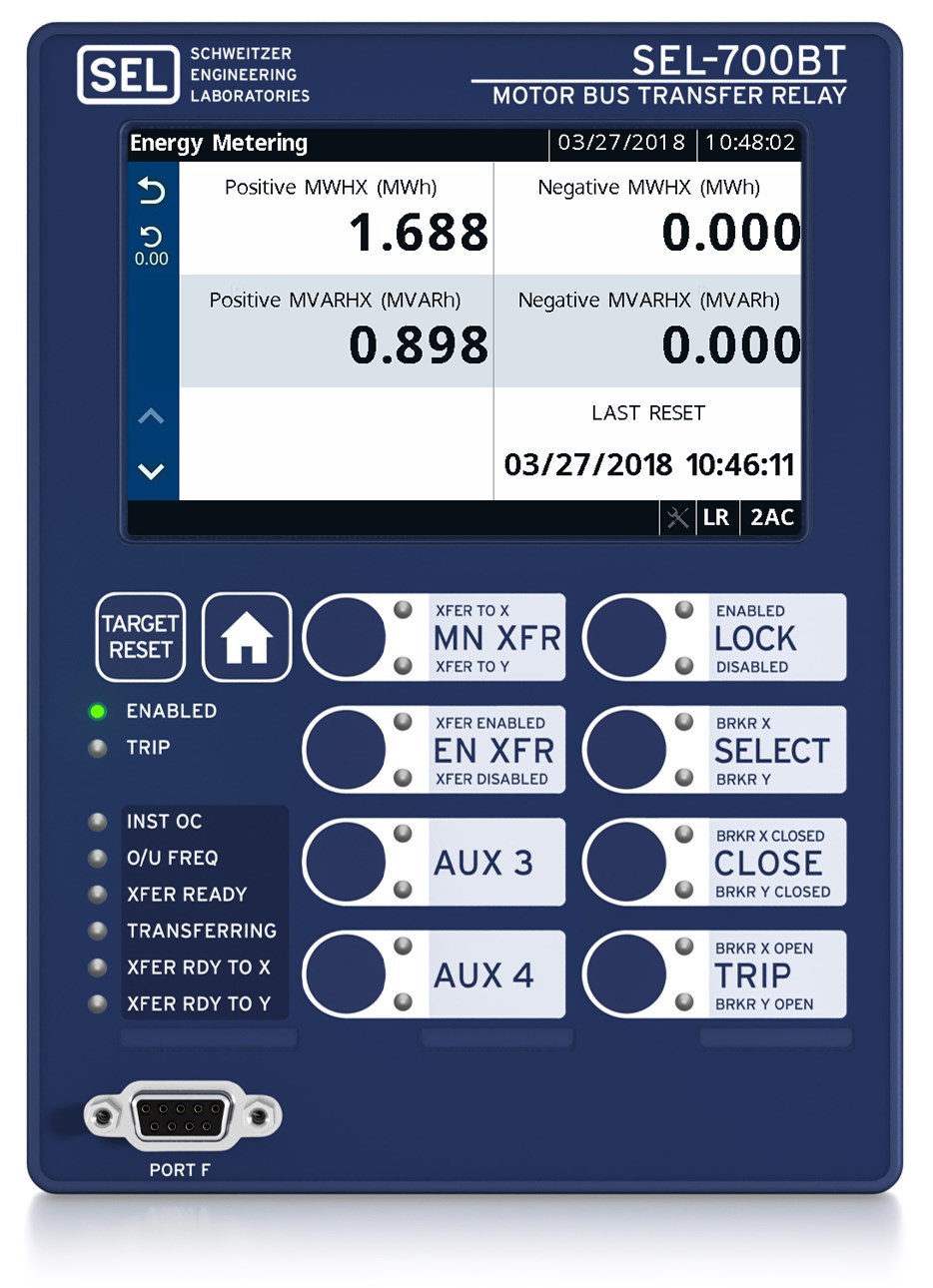
-
-
- 1
Easily review the time-stamped Sequential Events Recorder (SER) data, including whether or not the Relay Word bit asserted or deasserted, during root cause analysis of an event.
1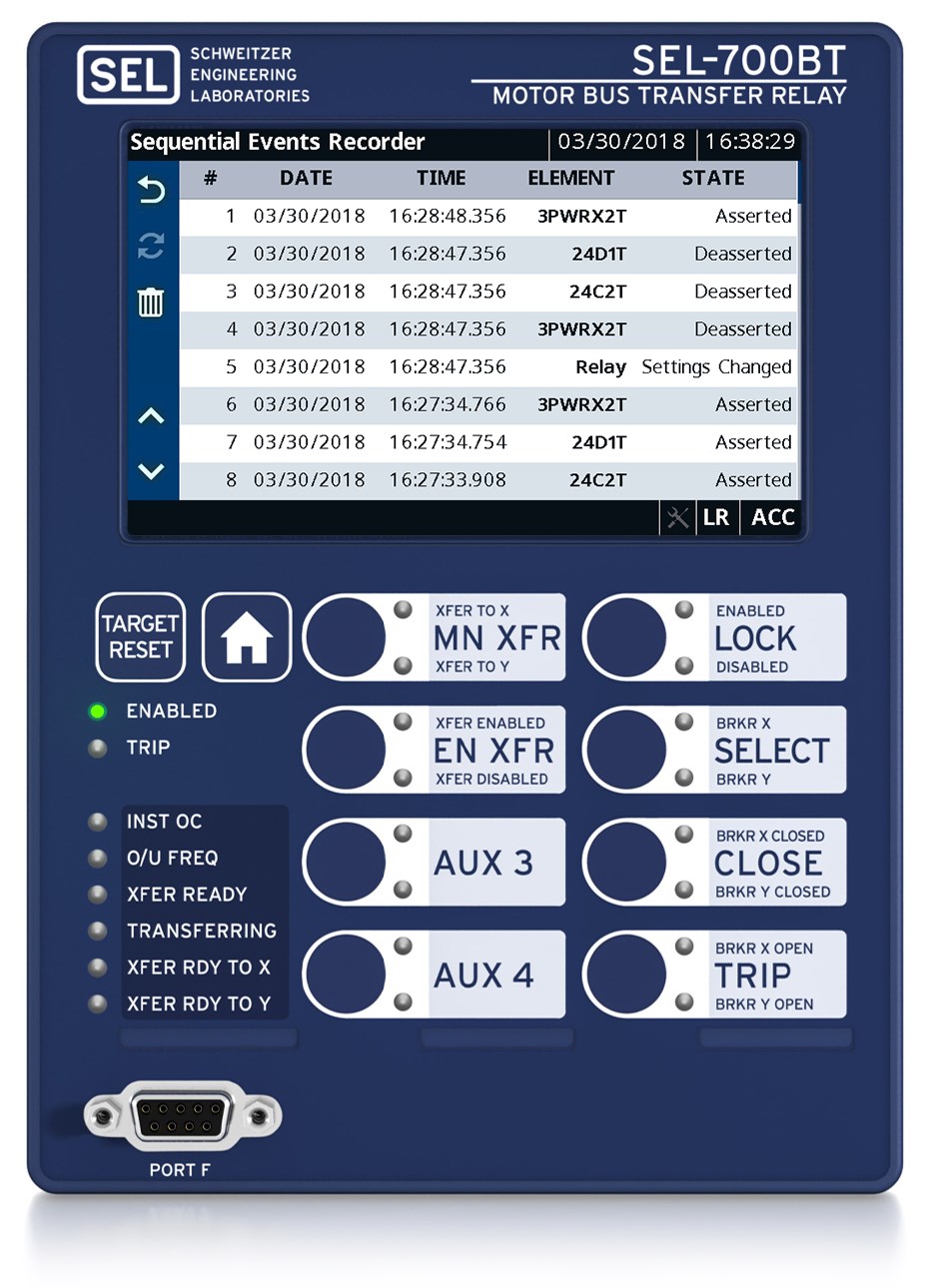
-
Details
Motor Bus Transfer Solution
The SEL-700BT has built-in logic for motor bus transfer, which allows for the instantaneous transfer of load to an auxiliary feeder from the primary feeder during faults to the primary feeder. The relay provides four types of bus transfers:
- Fast, in which the transfer occurs shortly after the first breaker opens and before the phase of the residual voltage deviates from the system.
- In-phase, which occurs when the phase of the system voltage and the residual voltage align.
- Residual, in which the relay waits for the residual voltage to fall below a certain threshold before transferring the bus.
- Fixed-time, which is configurable via SELogic control equations.
Protection Functions
Numerous current, voltage, frequency, distance, power, and out-of-step elements provide comprehensive protection for motor bus transfer applications.
IEC 61850 Test Mode
Use the IEC 61850 Test Mode to test system components in energized substations without fear of operating control output contacts.
Web Server Access
The built-in web server enables secure, remote access to the relay with password protection. You can download status reports or view metering and relay information remotely. This helps minimize trips to the relay location, saving time and money.
Accelerate Firmware Downloads
Simplify maintenance by downloading relay firmware via the Ethernet port. This also enables you to access and update all your network relays simultaneously.
RTD-Based Thermal Protection
Use an internal 10 RTD input card or an external SEL-2600 RTD Module to acquire thermal data for alarm, monitoring, and trip functions in the SEL-700BT.
Metering and Reporting
View Sequential Events Recorder (SER) and 180-cycle oscillographic event reports in COMTRADE and CEV formats to analyze system faults. Measure electrical, thermal, and analog quantities. You can retrieve COMTRADE files via Ethernet FTP or IEC 61850 MMS.
Touchscreen Display
The easy-to-use touchscreen interface provides a one-line mimic display for bay control and monitoring. You can view metered quantities, phasor diagrams, relay settings, event summaries, target statuses, SER data, and more. Extensive testing shows that the robust capacitive touchscreen display meets or exceeds industry standards as well as SEL quality and reliability requirements.
Vector Shift Protection
The vector shift element provides another element of protection for distributed generators connected to the utility network. It operates within three cycles—fast enough to prevent out-of-synchronization reclosing with the network feeders to avoid generator damage.
Flexible Design and Easy Installation
Choose from many installation and integration options given the relay's small form factor and slide-in expansion card options. The SEL-700BT can be installed into existing locations using available retrofit kits and mounting adapters, with no cutting or drilling.

- Motor bus transfer with bus protection
- EtherNet/IP for easy integration

- Motor bus transfer with bus protection
- Dual Ethernet ports with PRP failover communications channel
- Comprehensive protocols, including DNP3 and EtherNet/IP, for easy integration
Minimum Software Version
Latest Firmware Versions
There are no firmware versions available for this product.
| Product | Revision | Firmware ID | Date Available | Serial Number |
|---|---|---|---|---|
| SEL-700BT | R302-V1 | SEL-700BT-R302-V1-Z002001-D20240329 | 4/7/24 | ~3240980001 |
| SEL-700BT | R301-V6 | SEL-700BT-R301-V6-Z001001-D20240329 | 4/7/24 | ~3240980001 |
The Firmware IDs for older versions of the firmware can typically be found in Appendix A of the instruction manual.
Minimum Software Version
Instruction Manuals
Sales Resource Central access is required to view the content in this tab.
Sales Resource Central700BT - Software Tab
Configuration
acSELerator QuickSet SEL-5030 Software
QuickSet is a tool for engineers and technicians to quickly and easily configure, commission, and manage power system devices. QuickSet includes a Graphical Logic Editor and a device template tool to reduce configuration time and streamline deployment.
Learn more and download on the QuickSet software page.
acSELerator Architect SEL-5032 Software
Architect allows users to configure and document IEC 61850 systems that include GOOSE, Sampled Values (SV), or Manufacturing Message Specification (MMS) communications. Architect automatically compares SCL files with IEC 61850 requirements to ensure standard compliance.
Learn more and download on the Architect software page.
Automated Data Collection
SEL Data Management and Automation (DMA) Application Suite
Available on the Blueframe platform, DMA applications automatically collect, store, and manage device-specific information like oscillography, Sequence of Events (SOE) data, device settings, and property information. They also provide automated password rotation and streamlined device audits.
Learn more on the DMA software page.
Product Certifications


